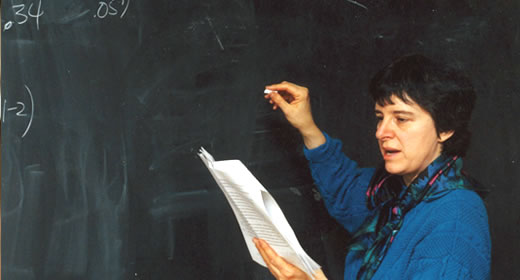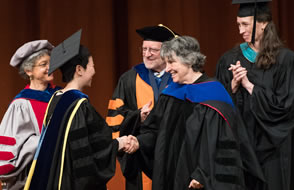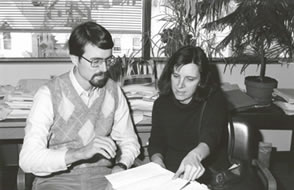
Being a tough editor... helping find financial resources needed to stay in school... lending support and encouragement: as a mentor Professor Mary Corcoran did all of that and more for the lives and careers of hundreds of alumni.
Now, as she prepares to retire from the University of Michigan, Corcoran’s students and colleagues praise her academic rigor and her warm (and often hilarious) personal support.
Sitting in her pleasantly-cluttered Ford School office, a maze of papers, books, and photos of her beloved children and grandchildren (about whom she shares stories with her students and anyone else willing to listen), Corcoran is asked to reflect on her career and the decades of students she’s taught. Corcoran laughs and refers to her time at Michigan as “Mary’s greatest hits.”
Education was always a priority for Corcoran. Her mother earned a college degree in the mid-1900s, a rare feat for women at the time.
Admitting to naiveté while pursuing her PhD in education and social policy from the Massachusetts Institute for Technology in the 1970s, Corcoran said she originally wanted to focus on poverty and “do good” by studying the impact of poverty on children.
“It was a time when people were saying poverty would be eliminated by 1980,” she says now, shaking her head. The issues, of course, were far more challenging than scholars or politicians anticipated.
Corcoran began digging deeper, eventually focusing her research on a narrower slice of the problem: why women were earning so much less than men in the labor market.
When Corcoran joined the Ford School’s faculty in 1976, she was one of few women professors in the social sciences at U-M. With appointments in Women’s Studies and the Institute for Social Research, her research was interdisciplinary and important—particularly in debunking myths surrounding women’s work histories and salaries.
“I was one of the first to have work histories for women and I could actually measure how much historical differences accounted for the gap in men and women on average,” Corcoran said. “I found out they were important.”
She collected data, too, to determine whether where a person started financially impacted their overall financial wealth. At the time, Corcoran says society had “greatly underestimated” the correlation between parental income to a child’s potential financial well-being.
 |
Paul Courant, Harold T. Shapiro Collegiate Professor of Public Policy and Senior Counselor to the Provost, wrote about a half-dozen papers with Corcoran, mostly on relationships between gender, pay, and other labor market outcomes. They studied the effects of working part-time to care for children on the lifetime income status of high-status professionals and also explored relationships between gender and pay of faculty at U-M; their work had an effect on University practice and policy.
Courant says that working with Corcoran was “one of the great pleasures of my life at Michigan.”
“Mary was part of a very strong group at Michigan, with Sheldon Danziger and others, who made the Ford School a major center for the study of poverty, gender, and race,” Courant said. “The work was important, her standards were high, the students who worked with us were terrific, and a good time was had by all.”
For all of Corcoran’s academic accomplishments, former students would make a case for her teaching and mentorship as central to her legacy.
Dudley Benoit, MPP ’95, currently serving as a Towsley Policymaker in Residence at the Ford School, said Corcoran’s passion inspired students in the classroom and beyond.
“She was always really excited about the work and pushing students to be inquisitive and embrace the work, to see what’s there,” he said. “She encouraged great conversations in the classroom, not just in the material, but how she teased it out of us and really encouraged people to think and converse.”
Mary Noonan (MPP ’97), associate professor and Director of Undergraduate Studies at the University of Iowa, still remembers making the decision to attend the Ford School for her masters degree. Noonan says Corcoran called her at home, and the pair spent an hour on the phone discussing her research and listing reasons why the other schools Noonan was considering were not as good as Michigan.
“Not only does she have superior methodological skills, but she is also able to communicate complex ideas in an easy-to-follow narrative,” Noonan says. “On top of all that, she is just a very nice person!—with a great sense of humor and a charming personality.”
While Noonan pursued her PhD in sociology and well into her career, Corcoran remained a mentor, guiding her in professional development and negotiation strategies.
“Once I started my job as an assistant professor at the University of Iowa, Mary did not forget about me,” she says. “It was at this point that I realized how truly lucky I was to have someone like Mary in my corner.”
 |
In 2002, Corcoran led the launch of the Ford School’s outstanding joint doctoral program—a pioneering model in which students earn a PhD in public policy alongside a disciplinary degree in sociology, economics, or political science.
Anju Paul (PhD '12) arrived to Michigan in 2009 to work on her PhD in sociology, but mentioned to Ford School Professor Ann Lin that she was also interested in public policy.
“She promptly marched me over to Mary’s office to introduce me to her,” Paul said. “Mary was a force of nature...Half an hour later, I walked out of the Ford School as a joint PhD student. That short meeting changed the course of my future career.”
Angel Harris (PhD ’05) was an inaugural member of the PhD program in public policy and sociology at U-M. Now a full professor of sociology at Duke, Harris identifies Corcoran as the first professor at U-M to provide him with serious mentorship, and he credits her guidance for his 2005 Horace H. Rackham Distinguished Dissertation Award.
“She has advised me more than any other faculty member at any level,” Harris notes.” She made me feel like a valued member of the Ford School, which became the primary place for my growth as an academic.”
Alexandra (Sasha) Killewald (PhD ’11) is now a professor of sociology at Harvard University. She said Corcoran made students feel like she believed in their work, even as she offered constructive criticism.
“Mary had the unique ability to be your biggest cheerleader while saying you simply had to cut two pages of your paper because it was really boring, and no one would care,” Killewald said with a laugh.
Decades of Corcoran’s former students and colleagues will smile at that—and will hear Corcoran’s warm laugh joining in.
Mark your calendars
We'll host a retirement party in Mary’s honor on thursday, September 27, 2018. Alumni and friends are welcome to attend. Look for more information soon.
--By Olivia Lewis (MPP '18)
Below is a formatted version of this article from State & Hill, the magazine of the Ford School.View the entire Spring 2018 State & Hill.
